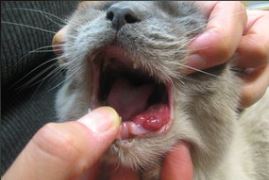Oral squamous cell carcinoma in cats is their most common oral tumor. This nasty growth in your cat’s mouth can lead to a lot of pain and can be a very aggressive pet cancer.
Oral squamous cell carcinoma (SCC) arises from the cells lining the oral cavity, and is the most common oral tumor encountered in cats and humans. While oral SCC has the potential to both aggressively invade local tissue and spread to other parts of the body, it is often the local effects of the tumor that cause the most problems. We do not know what causes SCC to occur in cats.

How do you know your cat has a tumor in the mouth?
Diagnosis and Initial Evaluation
Many cats with oral SCC will start drooling, have a foul odor, bleed from the mouth, or difficulty eating. Some cats may present with signs suggesting a dental problem, and SCC is diagnosed as an underlying cause of the dental disease. A diagnosis of SCC usually requires a biopsy. This can be done during routine dentistry.
Before starting therapy, tests are recommended to determine overall patient health, and if the tumor is localized to the primary site or if there is any evidence of spread. These tests include blood tests evaluating blood cell number and organ function, a fine needle aspirate of the lymph node draining the tumor area, and X-rays of the lungs and/or tumor site.
What to do when your cat has been diagnosed with oral squamous cell carcinoma?
Treatment
Surgery
Whenever possible, surgery is the first line of defense for SCC. Unfortunately, due to the very small size of a cat’s mouth and the relatively large size of the tumor when it is usually diagnosed, surgery is possible in less than 10% of cases. When surgery can be performed, very aggressive surgery, often removing parts of the upper or lower jaw, is recommended because of this tumor’s ability to deeply invade bone and other deep structures in the mouth. These types of surgery are difficult. It is recommended to see a veterinary surgeon who has advanced training in surgery.

Radiation therapy
Radiation therapy is another option when surgery is not possible. This involves the local delivery of a powerful form of radiation directly onto the tumor area. By itself, radiation therapy is rarely associated with significant tumor shrinkage. However, it has the potential to decrease pain associated with the tumor, and especially when combined with other forms of therapy, may increase the likelihood of meaningful tumor shrinkage occurring. Stereotactic radiation surgery involves higher doses of radiation given over 3 treatments. This is still considered a palliative treatment with only 40% of cats having a response and progression occurs in a few months. There are only a few radiation centers in the US. Click here to find one near you.

Chemotherapy and targeted therapy
There are several chemotherapy drugs that have been studied for the treatment of SCC in cats but tumor shrinkage is typically less than 10%.
There is a small molecule inhibitor called Palladia (toceranib) which is a targeted therapy. This appears to have some effect against SCC in cats. Palladia is a pill given at home, and most cats tolerate it well but side effects can occur so it is important to talk with your veterinarian. Palladia can help to shrink the tumor to make them more comfortable. Cats on this therapy have been found to tolerate it well overall, and those taking Palladia lived longer than those not on therapy. With Palladia many cats succumb to the disease within a few months. It is important to talk with an expert before using these types of medications. A veterinary oncologist is specially trained in all areas of pet cancer, and can go over all these options in detail with you. At Pet Cancer Care Consulting, we increase access to care by doing teleconsultations with pet owners and veterinarians.

Another form of treatment that has the potential to be useful in treating SCC is piroxicam which is sometimes effective in dogs with SCC. Piroxicam could make other treatments, like chemotherapy and radiotherapy, more effective. In addition to its potential antitumor effects, piroxicam is a very strong analgesic (pain medication), and can be helpful in addressing the discomfort and mouth irritation that can be associated with oral SCC. We do not recommend this medication in cats with kidney disease.
What will happen to my cat with oral squamous cell carcinoma?
Unfortunately, we are unable to cure cats with SCC. The goal with treatment is to do as much as we can to maintain an excellent quality of life for as long as possible. Sadly, regardless of the form of therapy chosen the survival is generally only a few months. Palliative care with pain medications and antibiotics are recommended to try to keep cats comfortable for as long as we can with this cancer.

Frequently Asked Questions
What do I do first when my cat is diagnosed with oral squamous cell carcinoma?
First determine if there is disease beyond the mouth by doing chest x-rays. Then talk with your veterinarian about treatment options. You may need to see a specialists for surgery, radiation therapy, or medical therapy.
How do I know if surgery is an option?
Talk with your vet and a surgeon. X-rays or CT scan of the head can determine how much of the mouth is involved with the tumor. This will help to determine if surgery is an option or not.
Is my cat suffering?
Sadly, oral squamous cell carcinoma can be a very painful disease. Many cats stop eating because of pain and infection at the tumor site. It is important to monitor your cat for signs of pain and infection so these can be treated. Unfortunately, many people when humanely euthanize when there cat is no longer able to have a quality of life.
Reference
- Withrow & MacEwn’s small animal clinical oncology 6th edition. Chapter 23: Cancer of the Gastrointestinal tract. 2020; 432-476.
